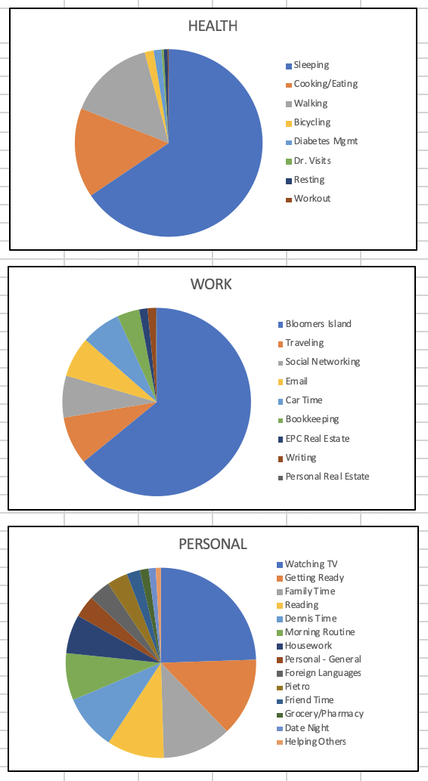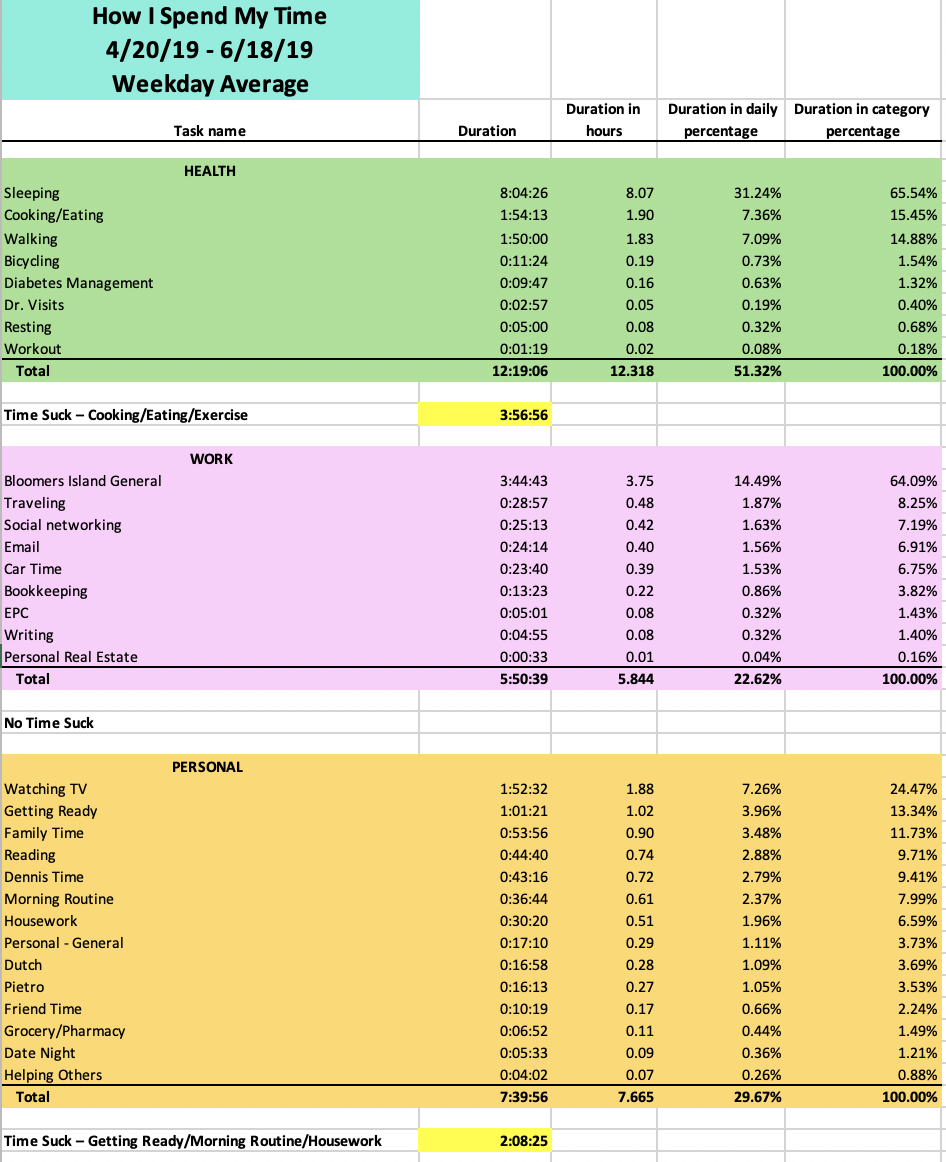|
Photo Credit: Seth Macey I measured 31 activities over a two month period and then averaged my weekdays. The results on where I spent my time were shocking. Neuroscientists have been studying time perception and its fluidity. They used to imagine a stopwatch in our brains that gives us a concept of the length of time spent on something. But, more recently they have found several areas in the brain that are responsible for time and our internal timekeeping. However, time is fluid and our estimates of it are not always accurate. There is even a disorder called, Dyschronometria, in which an individual cannot correctly estimate the amount of time that has passed. I’ve read a plethora of articles about improving your productivity by spending less time on certain things and more time on other things, and honestly, it doesn’t mean anything if you don’t really see where you are wasting time. And your time suck probably isn’t where you think it is unless you observe and measure. A while back, I started a Series on Medium called: The Secrets of the Universe. How You Can Use Quantum Physics to Immediately Improve Your Life. The first installment was titled, What Is The Most Powerful Tool You Can Access? And it was all about the observer effect: Measuring things changes them. Information collection can be the single most powerful tool to change your life. Want to get your financial life into shape? Measure everything you spend your money on. Simply by virtue of the fact that you are measuring it … changes it. I gave a brief example of how I kept track of everything I ate to lose ten pounds, and it worked remarkably well. My surprise was not that I could do it, or that this method would help me, but that by the simple act of observing, measuring and tracking everything I ate, caused me to eat less. It was almost like I didn’t want to disappoint myself. After my trial run with losing ten pounds, I thought, if it worked so well with that, why not observe and measure how I spend my time, because I want to be more efficient and thus more productive. This article is a follow up report with my progress and observations over the last two months. I used the app I recommended in my article, ATracker, set up categories of Health, Work and Personal and then broke those three areas down into different activities. I tried not to get too granular but yet, I wanted to get enough information that I could come up with realistic ideas on how to cut back on things I’m spending too much time on and spend more time on the things I should be spending more time on. Not unsurprisingly, there were a lot of surprises! Before I launch into those, I would say to you, don’t make decisions based on what you think you’re spending your time on. Measure it over a period of time. I did two months and I averaged the results for weekdays because this study is mostly about work for me. ATracker (and I’m sure there are others — this is just the app I used) is really flexible and simple. You have a lot of leeway to set up things however you want and the timer is an easy stop and start button, and if you forget, it is easy to go back and reconstruct. For example, if you are working on writing and switch over to bookkeeping and forget to press stop for writing and start for bookkeeping, you can easily go back and change that based on your best recollection. You can also export your data in a csv file which can then be sorted to analyze. Overall, it took effort, but the whole study did not take too much time in and of itself. Here is my analysis: The Good, The Bad, and The Surprising
You may notice that the total time is more than 24 hours, but that is because I am multi-tasking; Like walking my dog, Pietro, practicing Dutch, exercising, and listen to audiobooks (Reading) at the same time. That adds about two hours to my day which is great.  To increase my productivity, I tried to focus on what I called my, “time sucks” — things that seemed to use so much of my time. Broad stroke, I am spending more than 75% of my time in each category on just a handful of activities. I spend more time sleeping than any other activity — that old saying, “You can sleep when you’re dead,” comes to mind, but I believe we all need eight hours a day to function, so no time savings there. How can I be more efficient without sacrificing my health? There are only 24 hours in a day after all. I also don’t want to sacrifice the things I cherish most like my loved ones, exercise, and learning foreign languages. Clearly, though, I need to spend more time on Bloomers Island, Real Estate, and Writing, and less time on Watching News, Housework, Cooking/Eating, Morning Routine, and Exercise to bring my dreams to life. How do I do that? By becoming more efficient. Here’s my list of ideas: 1. Hire a housekeeper even if it’s just twice a month, to help with housekeeping. The time I spend on that (mostly weekends), I can use to write. 2. Grocery shop every other week instead of once a week. Explore grocery delivery services. Load up once a month on dry good staples like coffee, paper towels, etc. 3. Eat out more and implement meal prep on Sundays. 4. Every meal doesn’t have to be made from scratch. Utilize some shortcuts like buy a jar of minced garlic instead of mincing my own garlic. 5. Rinse dishes right after eating to eliminate time-consuming cleanup. 6. Develop more intense workouts in the morning to reduce time, e.g. run for an hour instead of walking for two hours. 7. Watch less T.V. and spend that time writing. Carve out an hour each morning for writing. 8. Be more focused — finish my task instead of jumping from one task to another and then back again — because that takes extra time. Honor transitions between right brain and left brain activities for improved focus. (Time tracking actually helps me do that.) 9. Implement the Pomodoro Technique: I’ve experimented with this and it works better than I expected. I spend 25 intense minutes working on a particular thing, and then I take a five minute break. 10. I can definitely get moving faster and better in the morning. Do I really need a half hour to drink my coffee and rub the sleep out of my eyes? I don’t think so. My conclusion after seeing the results of my study is that most of us believe we are spending more time on the things we dislike than we really are, and less on things we love doing or should be doing to bring our dreams to life. Our perception of time is distorted. And you may think you know what you are spending your time on but you may not. I suggest spend a couple months measuring it (observing) and see if your perception changes. After just the first couple weeks of tracking my time I saw that I was only spending an average of three hours a work day on Bloomers Island. I was shocked. That was not nearly enough! I made an immediate effort to increase that and it went to four hours. The simple act of observing, changed it. Accept my challenge in trying this for a couple months. Let me know what your surprises are.
0 Comments
Leave a Reply. |
All images and designs copyright © 2008-2020 Cynthia Wylie. All Rights Reserved. Contact for licensing opportunities.




 RSS Feed
RSS Feed








